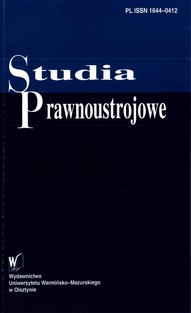Pomiędzy prawem a etyką – wolność słowa w zawodzie adwokata w świetle orzecznictwa Europejskiego Trybunału Praw Człowieka
Between law and morality – freedom of expression in legal professions considering European Court of Human Rights jurisprudence
Author(s): Dagmara Jaroszewska-ChoraśSubject(s): Human Rights and Humanitarian Law, Ethics / Practical Philosophy, EU-Legislation
Published by: Wydawnictwo Uniwersytetu Warmińsko-Mazurskiego w Olsztynie
Keywords: Human rights; legal ethics; Freedom of speech; limits of the freedom of speech of advocates; European Court of Human Rights; European Convention of Human Rights;
Summary/Abstract: Freedom of speech is an important guarantee of the free exercise of the profession by advocates. An advocate belongs to the profession of public trust, which means that his/her actions are determined by professional ethics, by the oath, by the appropriate education and the obtained specialization, as well as by the tradition of a corporation. The major goal and assumption of this paper is the analysis of the ethical and legal aspects related to the performance of professional duties by advocates in the context of one of their most important guarantees, namely the freedom of expression. This study contains two aspects: on one hand it is devoted to the matter of the ethics of advocates. The second part concerns the analysis of the selected jurisprudence of the European Court of Human Rights (ECHR). The most important conclusion coming from the presented analysis of the jurisprudence of the European Court of Human Rights is that the freedom of speech in the case of advocates has its limits. The Court clearly distinguishes the aspects concerning the freedom of speech of advocates in the courtroom and outside of the court. In the first case, the freedom of expression benefiting advocates is quite broad. However, their statements cannot contain any offensive comments, remarks or offensive language. On the other hand, the analysis of ECHR judgements shows that the freedom of speech and expression exercised outside of the courtroom is more limited. In some situations, as presented in this paper, the judiciary system interprets the words of advocates too literally and restrictively, which results in penalties for violating the freedom of speech. However, whenever the penalty is too strict, such judgement may lead to a violation of Article 10 of the European Convention on Human Rights.
Journal: Studia Prawnoustrojowe
- Issue Year: 2023
- Issue No: 61
- Page Range: 113-129
- Page Count: 18
- Language: Polish

